Unit 4: The Hospitality Business Toolkit - Financial and HR Report
VerifiedAdded on 2022/12/23
|18
|4523
|277
Report
AI Summary
This report examines the financial and human resource management practices within the hospitality industry, using the Marriott Hotel as a case study. Part A delves into the principles of managing and monitoring financial performance, including consistency, timeliness, justification, documentation, and verification. It details the application of double-entry bookkeeping, preparation of trial balances, cost analysis (fixed and variable), and the importance of accurate transaction recording. Part 2 focuses on the HR cycle, emphasizing recruitment, orientation, career planning, retention, and separation. It highlights the significance of retaining and developing talent, and presents a performance management plan for addressing negative behavior and staff retention issues. The report also covers relevant legislation, the impact of employment and contract law on business decisions, interrelationships of functional roles, and methods for communication and coordination to strengthen the value chain. The conclusion summarizes the key findings, and references are provided.
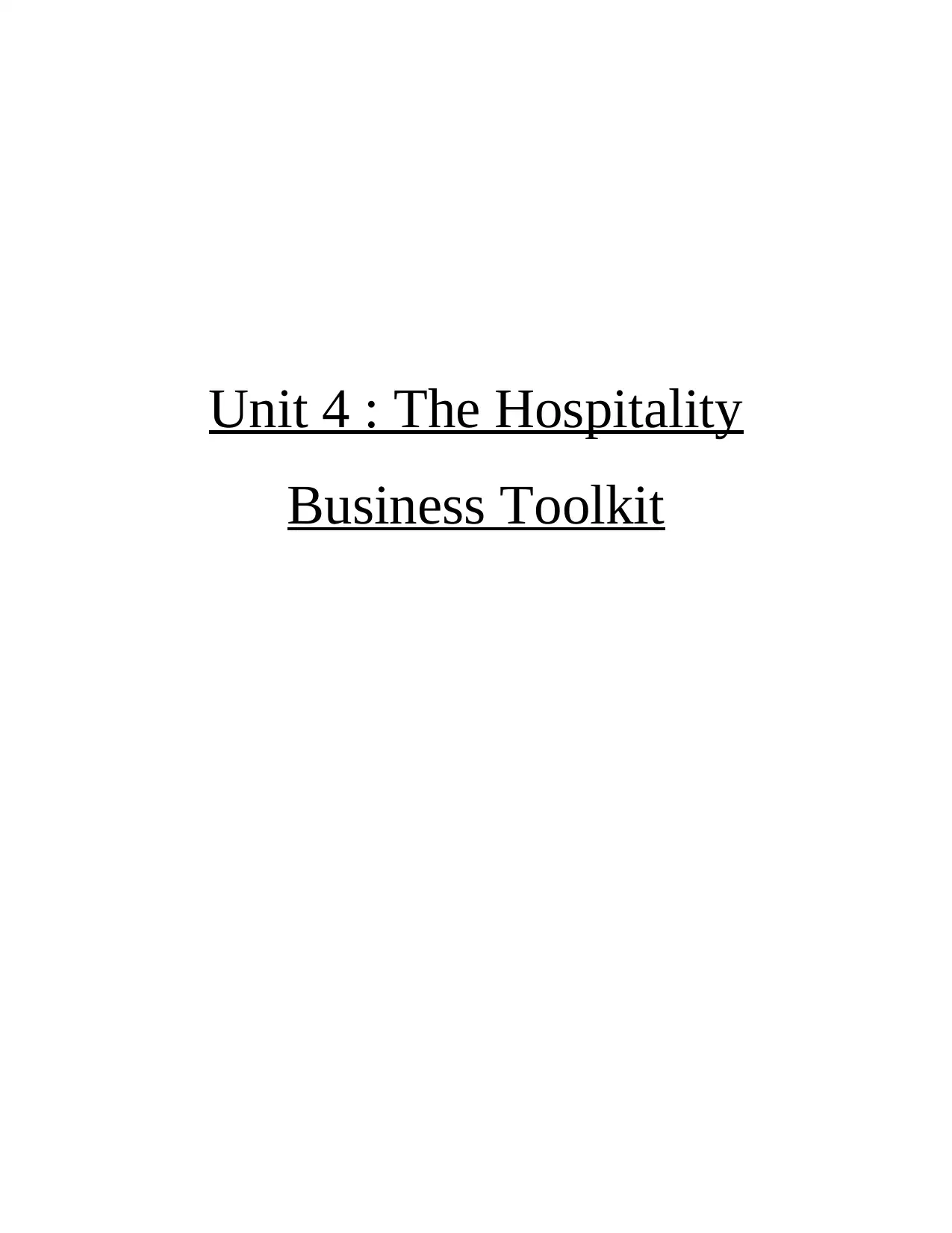
Unit 4 : The Hospitality
Business Toolkit
Business Toolkit
Paraphrase This Document
Need a fresh take? Get an instant paraphrase of this document with our AI Paraphraser
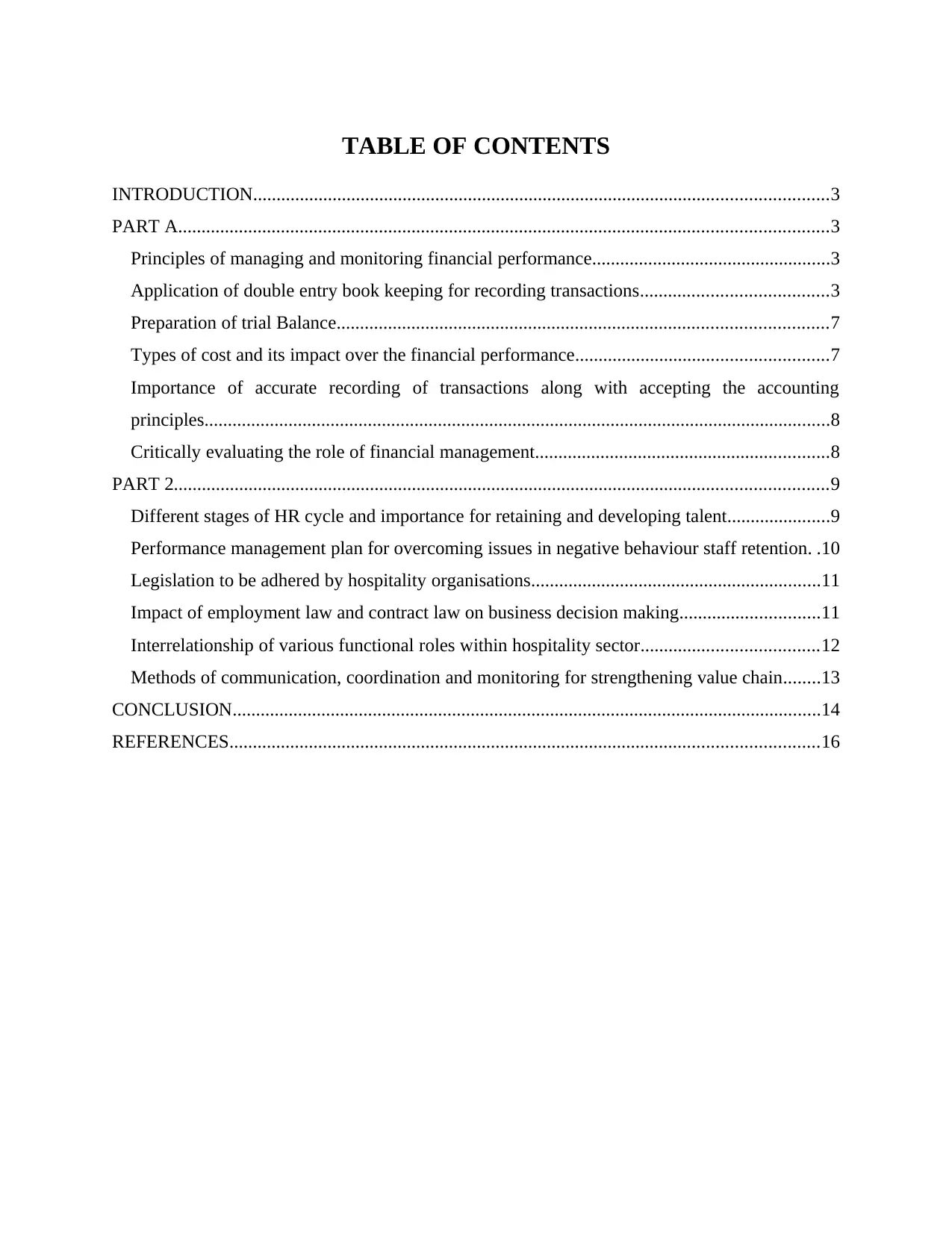
TABLE OF CONTENTS
INTRODUCTION...........................................................................................................................3
PART A...........................................................................................................................................3
Principles of managing and monitoring financial performance...................................................3
Application of double entry book keeping for recording transactions........................................3
Preparation of trial Balance.........................................................................................................7
Types of cost and its impact over the financial performance......................................................7
Importance of accurate recording of transactions along with accepting the accounting
principles......................................................................................................................................8
Critically evaluating the role of financial management...............................................................8
PART 2............................................................................................................................................9
Different stages of HR cycle and importance for retaining and developing talent......................9
Performance management plan for overcoming issues in negative behaviour staff retention. .10
Legislation to be adhered by hospitality organisations..............................................................11
Impact of employment law and contract law on business decision making..............................11
Interrelationship of various functional roles within hospitality sector......................................12
Methods of communication, coordination and monitoring for strengthening value chain........13
CONCLUSION..............................................................................................................................14
REFERENCES..............................................................................................................................16
INTRODUCTION...........................................................................................................................3
PART A...........................................................................................................................................3
Principles of managing and monitoring financial performance...................................................3
Application of double entry book keeping for recording transactions........................................3
Preparation of trial Balance.........................................................................................................7
Types of cost and its impact over the financial performance......................................................7
Importance of accurate recording of transactions along with accepting the accounting
principles......................................................................................................................................8
Critically evaluating the role of financial management...............................................................8
PART 2............................................................................................................................................9
Different stages of HR cycle and importance for retaining and developing talent......................9
Performance management plan for overcoming issues in negative behaviour staff retention. .10
Legislation to be adhered by hospitality organisations..............................................................11
Impact of employment law and contract law on business decision making..............................11
Interrelationship of various functional roles within hospitality sector......................................12
Methods of communication, coordination and monitoring for strengthening value chain........13
CONCLUSION..............................................................................................................................14
REFERENCES..............................................................................................................................16
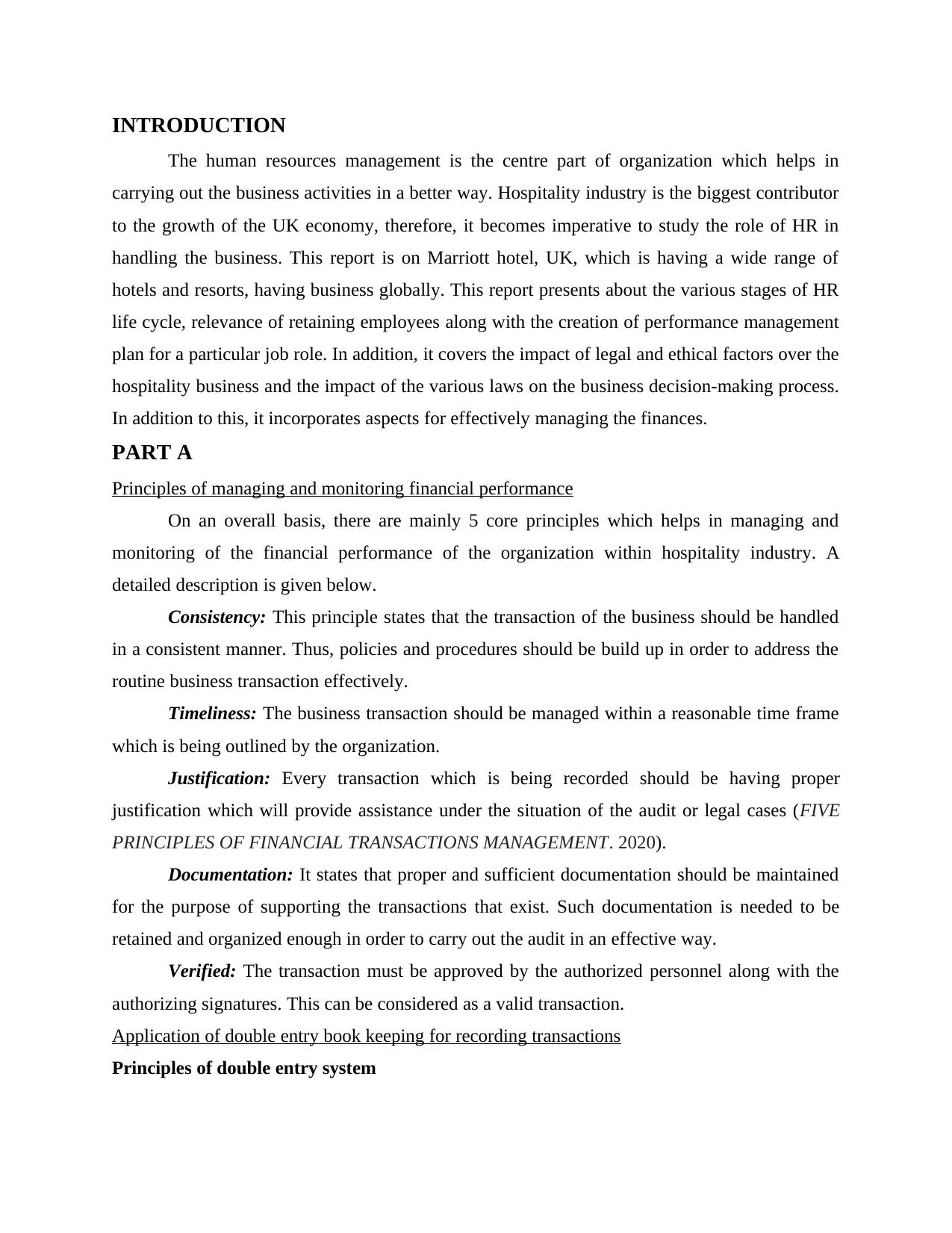
INTRODUCTION
The human resources management is the centre part of organization which helps in
carrying out the business activities in a better way. Hospitality industry is the biggest contributor
to the growth of the UK economy, therefore, it becomes imperative to study the role of HR in
handling the business. This report is on Marriott hotel, UK, which is having a wide range of
hotels and resorts, having business globally. This report presents about the various stages of HR
life cycle, relevance of retaining employees along with the creation of performance management
plan for a particular job role. In addition, it covers the impact of legal and ethical factors over the
hospitality business and the impact of the various laws on the business decision-making process.
In addition to this, it incorporates aspects for effectively managing the finances.
PART A
Principles of managing and monitoring financial performance
On an overall basis, there are mainly 5 core principles which helps in managing and
monitoring of the financial performance of the organization within hospitality industry. A
detailed description is given below.
Consistency: This principle states that the transaction of the business should be handled
in a consistent manner. Thus, policies and procedures should be build up in order to address the
routine business transaction effectively.
Timeliness: The business transaction should be managed within a reasonable time frame
which is being outlined by the organization.
Justification: Every transaction which is being recorded should be having proper
justification which will provide assistance under the situation of the audit or legal cases (FIVE
PRINCIPLES OF FINANCIAL TRANSACTIONS MANAGEMENT. 2020).
Documentation: It states that proper and sufficient documentation should be maintained
for the purpose of supporting the transactions that exist. Such documentation is needed to be
retained and organized enough in order to carry out the audit in an effective way.
Verified: The transaction must be approved by the authorized personnel along with the
authorizing signatures. This can be considered as a valid transaction.
Application of double entry book keeping for recording transactions
Principles of double entry system
The human resources management is the centre part of organization which helps in
carrying out the business activities in a better way. Hospitality industry is the biggest contributor
to the growth of the UK economy, therefore, it becomes imperative to study the role of HR in
handling the business. This report is on Marriott hotel, UK, which is having a wide range of
hotels and resorts, having business globally. This report presents about the various stages of HR
life cycle, relevance of retaining employees along with the creation of performance management
plan for a particular job role. In addition, it covers the impact of legal and ethical factors over the
hospitality business and the impact of the various laws on the business decision-making process.
In addition to this, it incorporates aspects for effectively managing the finances.
PART A
Principles of managing and monitoring financial performance
On an overall basis, there are mainly 5 core principles which helps in managing and
monitoring of the financial performance of the organization within hospitality industry. A
detailed description is given below.
Consistency: This principle states that the transaction of the business should be handled
in a consistent manner. Thus, policies and procedures should be build up in order to address the
routine business transaction effectively.
Timeliness: The business transaction should be managed within a reasonable time frame
which is being outlined by the organization.
Justification: Every transaction which is being recorded should be having proper
justification which will provide assistance under the situation of the audit or legal cases (FIVE
PRINCIPLES OF FINANCIAL TRANSACTIONS MANAGEMENT. 2020).
Documentation: It states that proper and sufficient documentation should be maintained
for the purpose of supporting the transactions that exist. Such documentation is needed to be
retained and organized enough in order to carry out the audit in an effective way.
Verified: The transaction must be approved by the authorized personnel along with the
authorizing signatures. This can be considered as a valid transaction.
Application of double entry book keeping for recording transactions
Principles of double entry system
⊘ This is a preview!⊘
Do you want full access?
Subscribe today to unlock all pages.

Trusted by 1+ million students worldwide
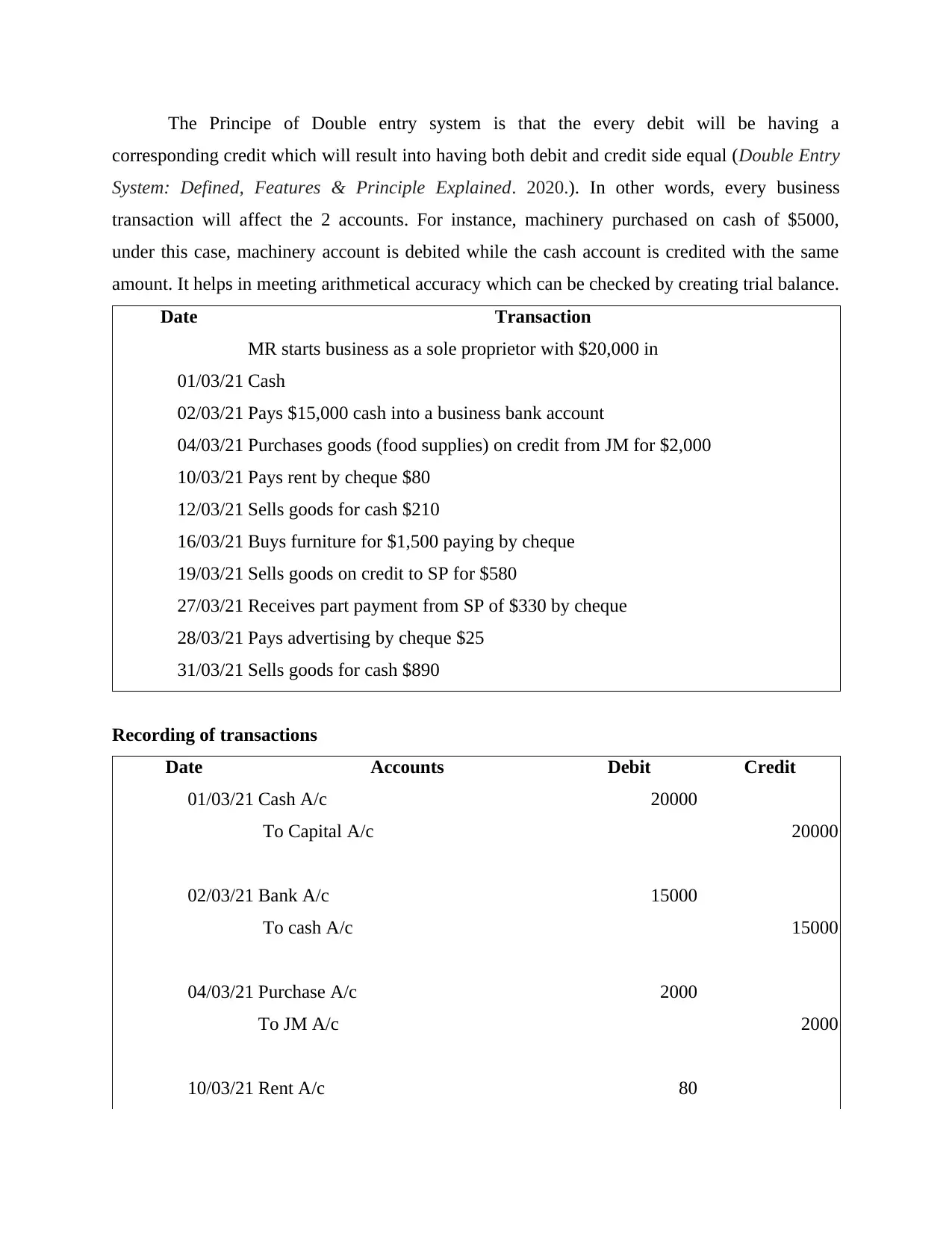
The Principe of Double entry system is that the every debit will be having a
corresponding credit which will result into having both debit and credit side equal (Double Entry
System: Defined, Features & Principle Explained. 2020.). In other words, every business
transaction will affect the 2 accounts. For instance, machinery purchased on cash of $5000,
under this case, machinery account is debited while the cash account is credited with the same
amount. It helps in meeting arithmetical accuracy which can be checked by creating trial balance.
Date Transaction
01/03/21
MR starts business as a sole proprietor with $20,000 in
Cash
02/03/21 Pays $15,000 cash into a business bank account
04/03/21 Purchases goods (food supplies) on credit from JM for $2,000
10/03/21 Pays rent by cheque $80
12/03/21 Sells goods for cash $210
16/03/21 Buys furniture for $1,500 paying by cheque
19/03/21 Sells goods on credit to SP for $580
27/03/21 Receives part payment from SP of $330 by cheque
28/03/21 Pays advertising by cheque $25
31/03/21 Sells goods for cash $890
Recording of transactions
Date Accounts Debit Credit
01/03/21 Cash A/c 20000
To Capital A/c 20000
02/03/21 Bank A/c 15000
To cash A/c 15000
04/03/21 Purchase A/c 2000
To JM A/c 2000
10/03/21 Rent A/c 80
corresponding credit which will result into having both debit and credit side equal (Double Entry
System: Defined, Features & Principle Explained. 2020.). In other words, every business
transaction will affect the 2 accounts. For instance, machinery purchased on cash of $5000,
under this case, machinery account is debited while the cash account is credited with the same
amount. It helps in meeting arithmetical accuracy which can be checked by creating trial balance.
Date Transaction
01/03/21
MR starts business as a sole proprietor with $20,000 in
Cash
02/03/21 Pays $15,000 cash into a business bank account
04/03/21 Purchases goods (food supplies) on credit from JM for $2,000
10/03/21 Pays rent by cheque $80
12/03/21 Sells goods for cash $210
16/03/21 Buys furniture for $1,500 paying by cheque
19/03/21 Sells goods on credit to SP for $580
27/03/21 Receives part payment from SP of $330 by cheque
28/03/21 Pays advertising by cheque $25
31/03/21 Sells goods for cash $890
Recording of transactions
Date Accounts Debit Credit
01/03/21 Cash A/c 20000
To Capital A/c 20000
02/03/21 Bank A/c 15000
To cash A/c 15000
04/03/21 Purchase A/c 2000
To JM A/c 2000
10/03/21 Rent A/c 80
Paraphrase This Document
Need a fresh take? Get an instant paraphrase of this document with our AI Paraphraser
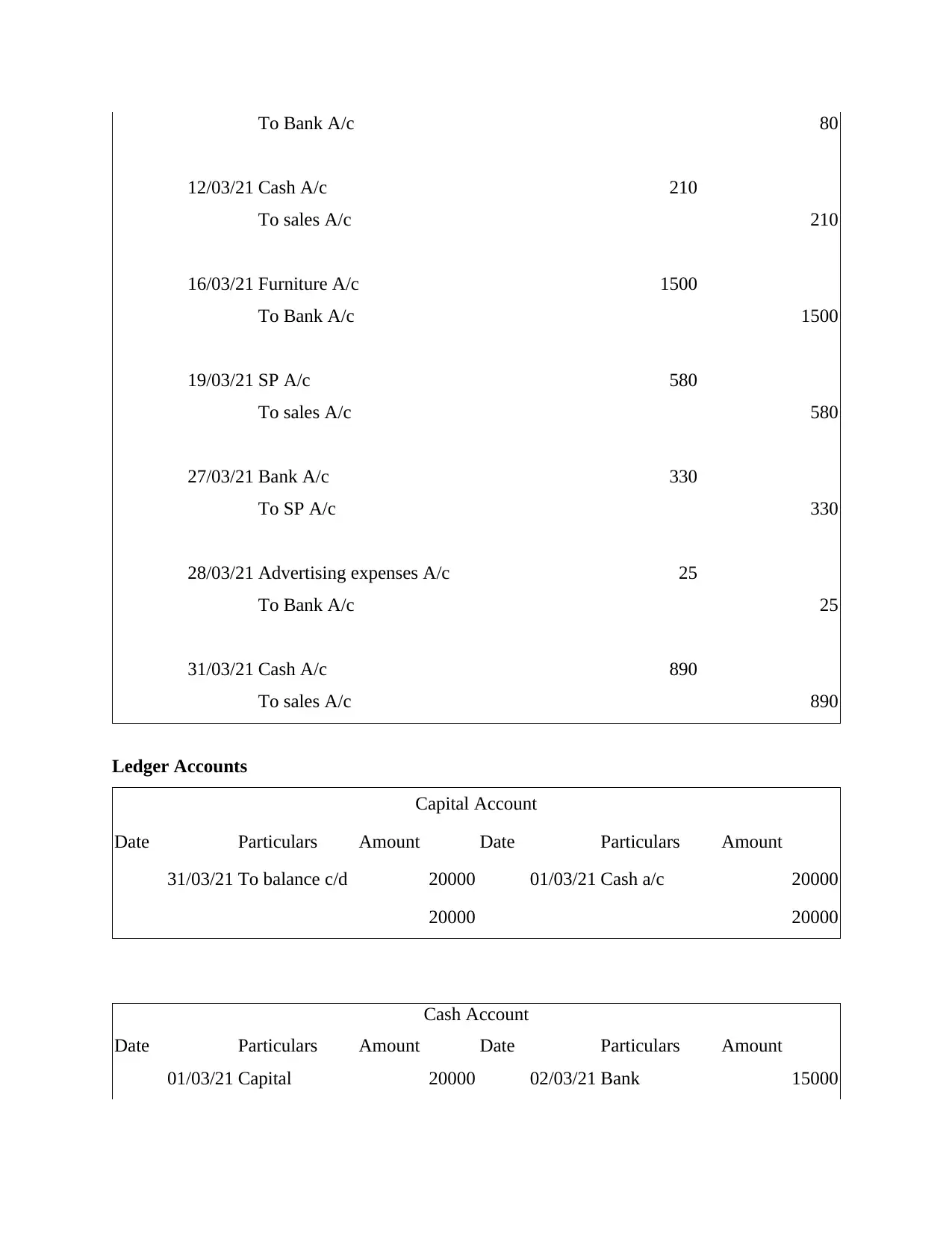
To Bank A/c 80
12/03/21 Cash A/c 210
To sales A/c 210
16/03/21 Furniture A/c 1500
To Bank A/c 1500
19/03/21 SP A/c 580
To sales A/c 580
27/03/21 Bank A/c 330
To SP A/c 330
28/03/21 Advertising expenses A/c 25
To Bank A/c 25
31/03/21 Cash A/c 890
To sales A/c 890
Ledger Accounts
Capital Account
Date Particulars Amount Date Particulars Amount
31/03/21 To balance c/d 20000 01/03/21 Cash a/c 20000
20000 20000
Cash Account
Date Particulars Amount Date Particulars Amount
01/03/21 Capital 20000 02/03/21 Bank 15000
12/03/21 Cash A/c 210
To sales A/c 210
16/03/21 Furniture A/c 1500
To Bank A/c 1500
19/03/21 SP A/c 580
To sales A/c 580
27/03/21 Bank A/c 330
To SP A/c 330
28/03/21 Advertising expenses A/c 25
To Bank A/c 25
31/03/21 Cash A/c 890
To sales A/c 890
Ledger Accounts
Capital Account
Date Particulars Amount Date Particulars Amount
31/03/21 To balance c/d 20000 01/03/21 Cash a/c 20000
20000 20000
Cash Account
Date Particulars Amount Date Particulars Amount
01/03/21 Capital 20000 02/03/21 Bank 15000
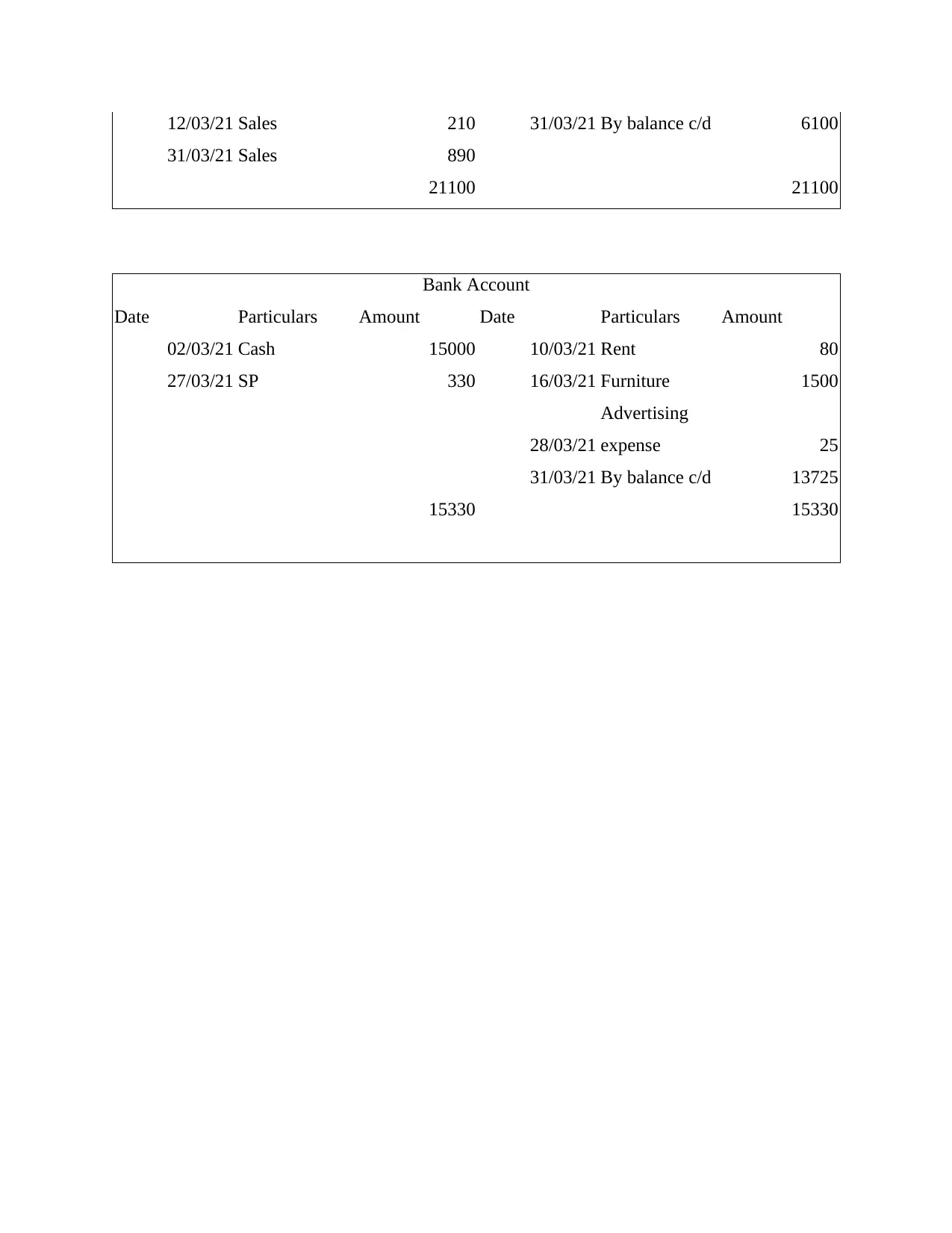
12/03/21 Sales 210 31/03/21 By balance c/d 6100
31/03/21 Sales 890
21100 21100
Bank Account
Date Particulars Amount Date Particulars Amount
02/03/21 Cash 15000 10/03/21 Rent 80
27/03/21 SP 330 16/03/21 Furniture 1500
28/03/21
Advertising
expense 25
31/03/21 By balance c/d 13725
15330 15330
31/03/21 Sales 890
21100 21100
Bank Account
Date Particulars Amount Date Particulars Amount
02/03/21 Cash 15000 10/03/21 Rent 80
27/03/21 SP 330 16/03/21 Furniture 1500
28/03/21
Advertising
expense 25
31/03/21 By balance c/d 13725
15330 15330
⊘ This is a preview!⊘
Do you want full access?
Subscribe today to unlock all pages.

Trusted by 1+ million students worldwide
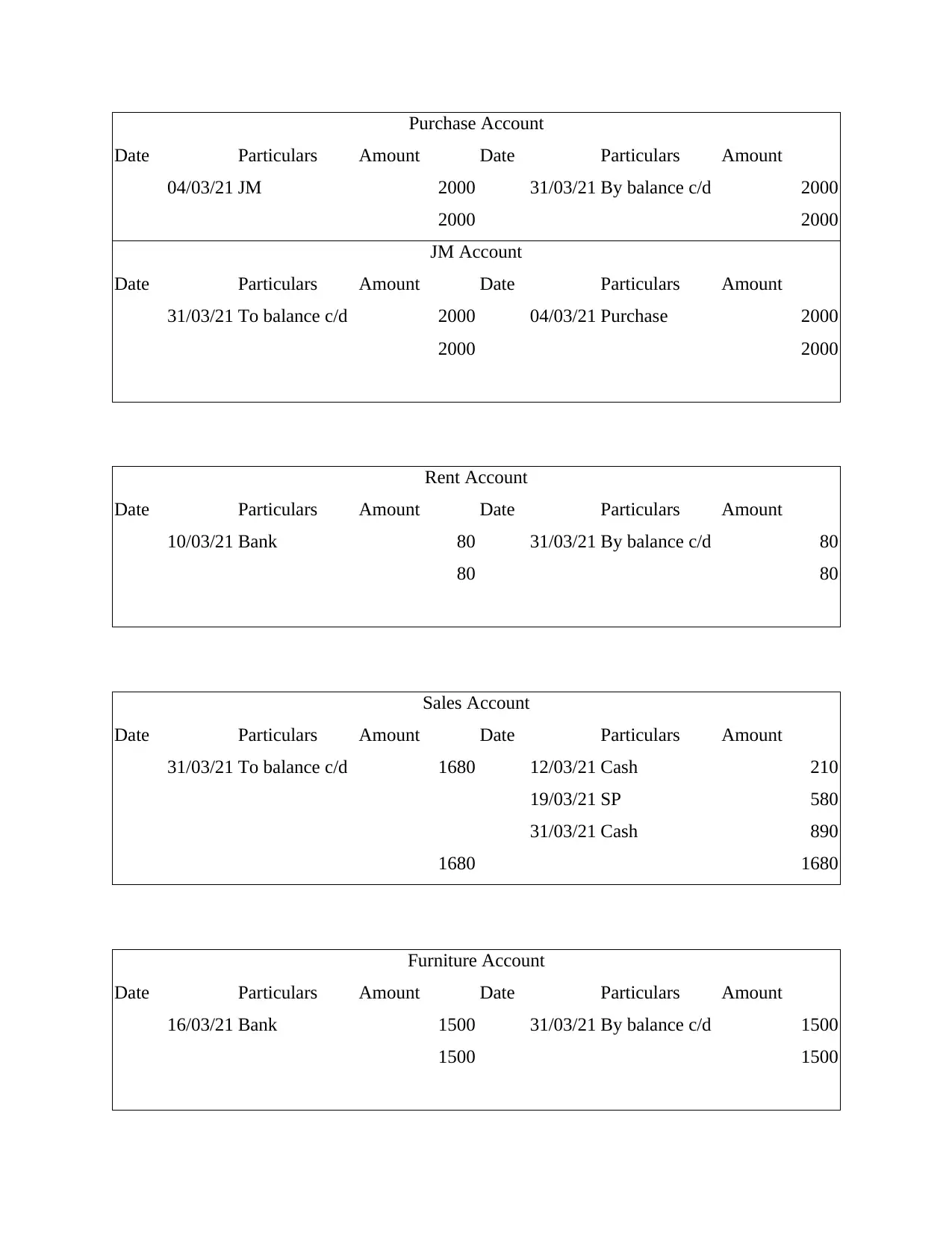
Purchase Account
Date Particulars Amount Date Particulars Amount
04/03/21 JM 2000 31/03/21 By balance c/d 2000
2000 2000
JM Account
Date Particulars Amount Date Particulars Amount
31/03/21 To balance c/d 2000 04/03/21 Purchase 2000
2000 2000
Rent Account
Date Particulars Amount Date Particulars Amount
10/03/21 Bank 80 31/03/21 By balance c/d 80
80 80
Sales Account
Date Particulars Amount Date Particulars Amount
31/03/21 To balance c/d 1680 12/03/21 Cash 210
19/03/21 SP 580
31/03/21 Cash 890
1680 1680
Furniture Account
Date Particulars Amount Date Particulars Amount
16/03/21 Bank 1500 31/03/21 By balance c/d 1500
1500 1500
Date Particulars Amount Date Particulars Amount
04/03/21 JM 2000 31/03/21 By balance c/d 2000
2000 2000
JM Account
Date Particulars Amount Date Particulars Amount
31/03/21 To balance c/d 2000 04/03/21 Purchase 2000
2000 2000
Rent Account
Date Particulars Amount Date Particulars Amount
10/03/21 Bank 80 31/03/21 By balance c/d 80
80 80
Sales Account
Date Particulars Amount Date Particulars Amount
31/03/21 To balance c/d 1680 12/03/21 Cash 210
19/03/21 SP 580
31/03/21 Cash 890
1680 1680
Furniture Account
Date Particulars Amount Date Particulars Amount
16/03/21 Bank 1500 31/03/21 By balance c/d 1500
1500 1500
Paraphrase This Document
Need a fresh take? Get an instant paraphrase of this document with our AI Paraphraser
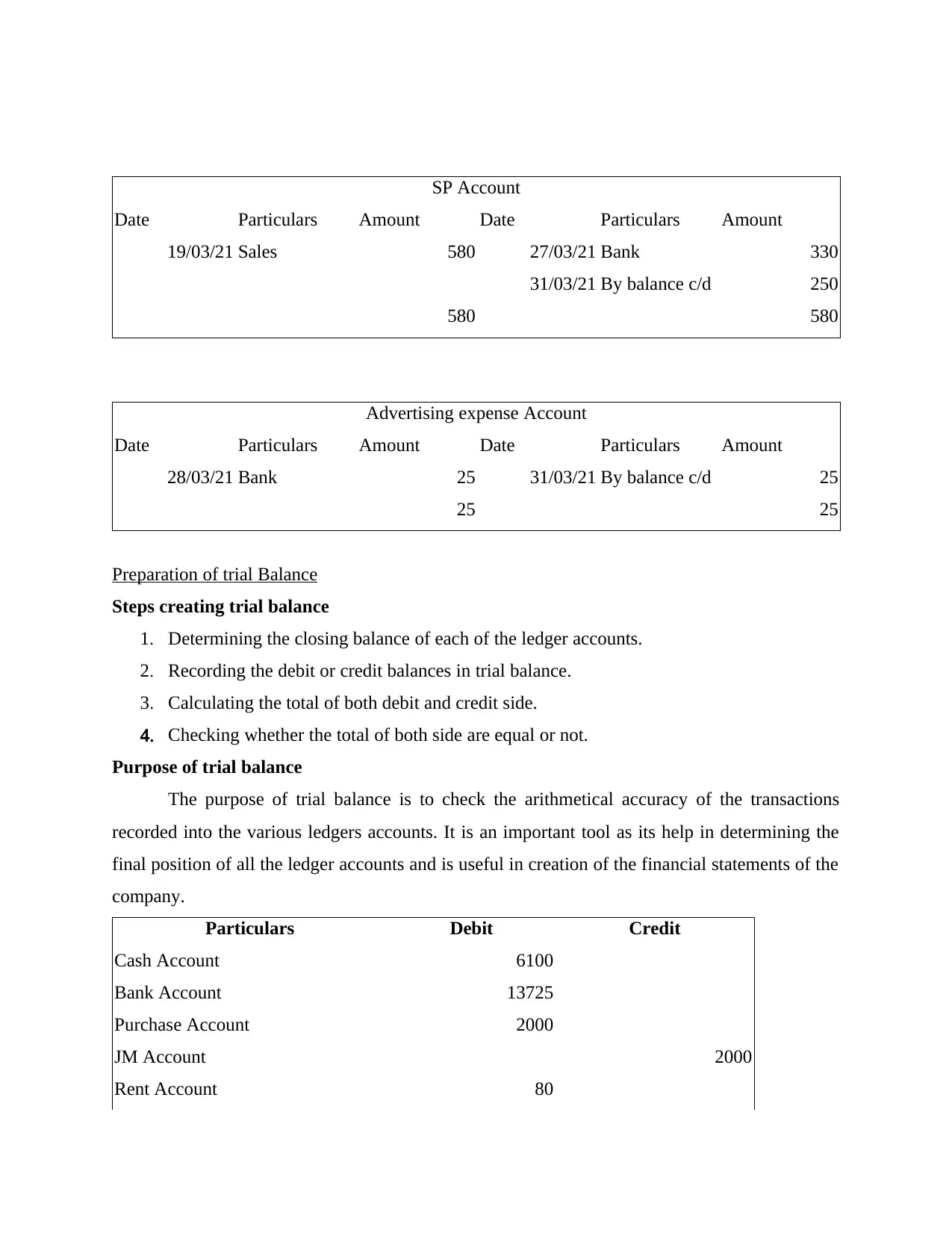
SP Account
Date Particulars Amount Date Particulars Amount
19/03/21 Sales 580 27/03/21 Bank 330
31/03/21 By balance c/d 250
580 580
Advertising expense Account
Date Particulars Amount Date Particulars Amount
28/03/21 Bank 25 31/03/21 By balance c/d 25
25 25
Preparation of trial Balance
Steps creating trial balance
1. Determining the closing balance of each of the ledger accounts.
2. Recording the debit or credit balances in trial balance.
3. Calculating the total of both debit and credit side.
4. Checking whether the total of both side are equal or not.
Purpose of trial balance
The purpose of trial balance is to check the arithmetical accuracy of the transactions
recorded into the various ledgers accounts. It is an important tool as its help in determining the
final position of all the ledger accounts and is useful in creation of the financial statements of the
company.
Particulars Debit Credit
Cash Account 6100
Bank Account 13725
Purchase Account 2000
JM Account 2000
Rent Account 80
Date Particulars Amount Date Particulars Amount
19/03/21 Sales 580 27/03/21 Bank 330
31/03/21 By balance c/d 250
580 580
Advertising expense Account
Date Particulars Amount Date Particulars Amount
28/03/21 Bank 25 31/03/21 By balance c/d 25
25 25
Preparation of trial Balance
Steps creating trial balance
1. Determining the closing balance of each of the ledger accounts.
2. Recording the debit or credit balances in trial balance.
3. Calculating the total of both debit and credit side.
4. Checking whether the total of both side are equal or not.
Purpose of trial balance
The purpose of trial balance is to check the arithmetical accuracy of the transactions
recorded into the various ledgers accounts. It is an important tool as its help in determining the
final position of all the ledger accounts and is useful in creation of the financial statements of the
company.
Particulars Debit Credit
Cash Account 6100
Bank Account 13725
Purchase Account 2000
JM Account 2000
Rent Account 80
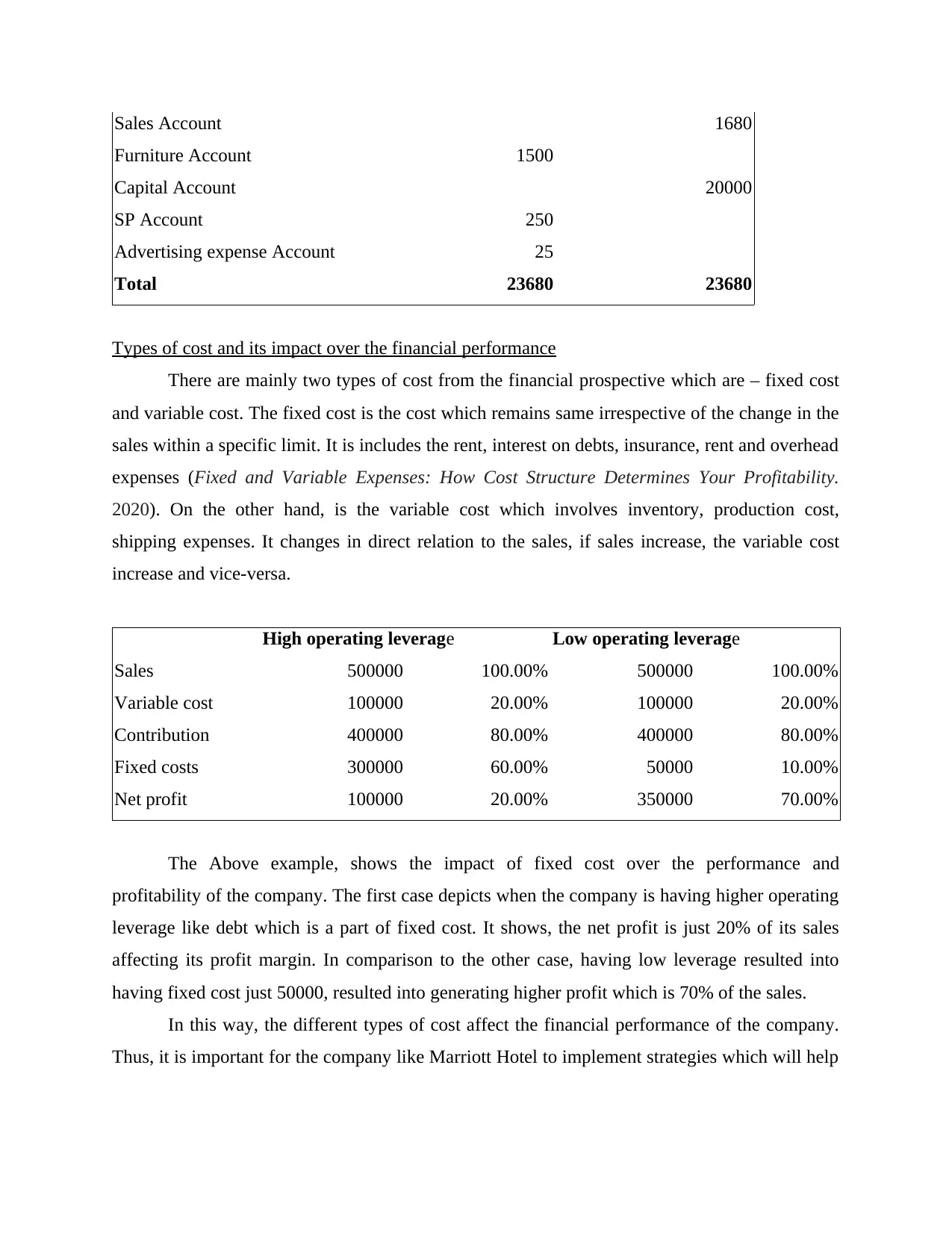
Sales Account 1680
Furniture Account 1500
Capital Account 20000
SP Account 250
Advertising expense Account 25
Total 23680 23680
Types of cost and its impact over the financial performance
There are mainly two types of cost from the financial prospective which are – fixed cost
and variable cost. The fixed cost is the cost which remains same irrespective of the change in the
sales within a specific limit. It is includes the rent, interest on debts, insurance, rent and overhead
expenses (Fixed and Variable Expenses: How Cost Structure Determines Your Profitability.
2020). On the other hand, is the variable cost which involves inventory, production cost,
shipping expenses. It changes in direct relation to the sales, if sales increase, the variable cost
increase and vice-versa.
High operating leverage Low operating leverage
Sales 500000 100.00% 500000 100.00%
Variable cost 100000 20.00% 100000 20.00%
Contribution 400000 80.00% 400000 80.00%
Fixed costs 300000 60.00% 50000 10.00%
Net profit 100000 20.00% 350000 70.00%
The Above example, shows the impact of fixed cost over the performance and
profitability of the company. The first case depicts when the company is having higher operating
leverage like debt which is a part of fixed cost. It shows, the net profit is just 20% of its sales
affecting its profit margin. In comparison to the other case, having low leverage resulted into
having fixed cost just 50000, resulted into generating higher profit which is 70% of the sales.
In this way, the different types of cost affect the financial performance of the company.
Thus, it is important for the company like Marriott Hotel to implement strategies which will help
Furniture Account 1500
Capital Account 20000
SP Account 250
Advertising expense Account 25
Total 23680 23680
Types of cost and its impact over the financial performance
There are mainly two types of cost from the financial prospective which are – fixed cost
and variable cost. The fixed cost is the cost which remains same irrespective of the change in the
sales within a specific limit. It is includes the rent, interest on debts, insurance, rent and overhead
expenses (Fixed and Variable Expenses: How Cost Structure Determines Your Profitability.
2020). On the other hand, is the variable cost which involves inventory, production cost,
shipping expenses. It changes in direct relation to the sales, if sales increase, the variable cost
increase and vice-versa.
High operating leverage Low operating leverage
Sales 500000 100.00% 500000 100.00%
Variable cost 100000 20.00% 100000 20.00%
Contribution 400000 80.00% 400000 80.00%
Fixed costs 300000 60.00% 50000 10.00%
Net profit 100000 20.00% 350000 70.00%
The Above example, shows the impact of fixed cost over the performance and
profitability of the company. The first case depicts when the company is having higher operating
leverage like debt which is a part of fixed cost. It shows, the net profit is just 20% of its sales
affecting its profit margin. In comparison to the other case, having low leverage resulted into
having fixed cost just 50000, resulted into generating higher profit which is 70% of the sales.
In this way, the different types of cost affect the financial performance of the company.
Thus, it is important for the company like Marriott Hotel to implement strategies which will help
⊘ This is a preview!⊘
Do you want full access?
Subscribe today to unlock all pages.

Trusted by 1+ million students worldwide
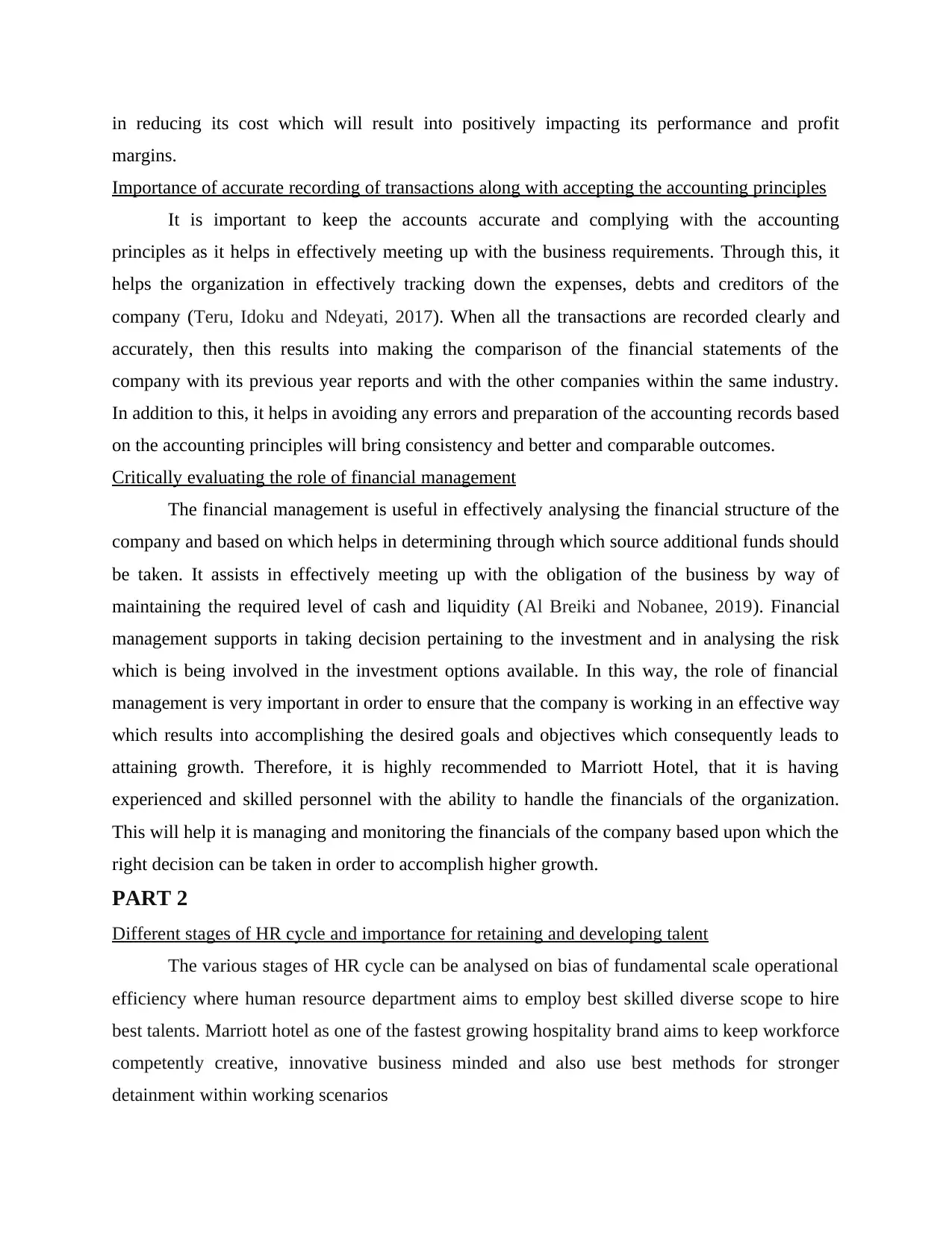
in reducing its cost which will result into positively impacting its performance and profit
margins.
Importance of accurate recording of transactions along with accepting the accounting principles
It is important to keep the accounts accurate and complying with the accounting
principles as it helps in effectively meeting up with the business requirements. Through this, it
helps the organization in effectively tracking down the expenses, debts and creditors of the
company (Teru, Idoku and Ndeyati, 2017). When all the transactions are recorded clearly and
accurately, then this results into making the comparison of the financial statements of the
company with its previous year reports and with the other companies within the same industry.
In addition to this, it helps in avoiding any errors and preparation of the accounting records based
on the accounting principles will bring consistency and better and comparable outcomes.
Critically evaluating the role of financial management
The financial management is useful in effectively analysing the financial structure of the
company and based on which helps in determining through which source additional funds should
be taken. It assists in effectively meeting up with the obligation of the business by way of
maintaining the required level of cash and liquidity (Al Breiki and Nobanee, 2019). Financial
management supports in taking decision pertaining to the investment and in analysing the risk
which is being involved in the investment options available. In this way, the role of financial
management is very important in order to ensure that the company is working in an effective way
which results into accomplishing the desired goals and objectives which consequently leads to
attaining growth. Therefore, it is highly recommended to Marriott Hotel, that it is having
experienced and skilled personnel with the ability to handle the financials of the organization.
This will help it is managing and monitoring the financials of the company based upon which the
right decision can be taken in order to accomplish higher growth.
PART 2
Different stages of HR cycle and importance for retaining and developing talent
The various stages of HR cycle can be analysed on bias of fundamental scale operational
efficiency where human resource department aims to employ best skilled diverse scope to hire
best talents. Marriott hotel as one of the fastest growing hospitality brand aims to keep workforce
competently creative, innovative business minded and also use best methods for stronger
detainment within working scenarios
margins.
Importance of accurate recording of transactions along with accepting the accounting principles
It is important to keep the accounts accurate and complying with the accounting
principles as it helps in effectively meeting up with the business requirements. Through this, it
helps the organization in effectively tracking down the expenses, debts and creditors of the
company (Teru, Idoku and Ndeyati, 2017). When all the transactions are recorded clearly and
accurately, then this results into making the comparison of the financial statements of the
company with its previous year reports and with the other companies within the same industry.
In addition to this, it helps in avoiding any errors and preparation of the accounting records based
on the accounting principles will bring consistency and better and comparable outcomes.
Critically evaluating the role of financial management
The financial management is useful in effectively analysing the financial structure of the
company and based on which helps in determining through which source additional funds should
be taken. It assists in effectively meeting up with the obligation of the business by way of
maintaining the required level of cash and liquidity (Al Breiki and Nobanee, 2019). Financial
management supports in taking decision pertaining to the investment and in analysing the risk
which is being involved in the investment options available. In this way, the role of financial
management is very important in order to ensure that the company is working in an effective way
which results into accomplishing the desired goals and objectives which consequently leads to
attaining growth. Therefore, it is highly recommended to Marriott Hotel, that it is having
experienced and skilled personnel with the ability to handle the financials of the organization.
This will help it is managing and monitoring the financials of the company based upon which the
right decision can be taken in order to accomplish higher growth.
PART 2
Different stages of HR cycle and importance for retaining and developing talent
The various stages of HR cycle can be analysed on bias of fundamental scale operational
efficiency where human resource department aims to employ best skilled diverse scope to hire
best talents. Marriott hotel as one of the fastest growing hospitality brand aims to keep workforce
competently creative, innovative business minded and also use best methods for stronger
detainment within working scenarios
Paraphrase This Document
Need a fresh take? Get an instant paraphrase of this document with our AI Paraphraser
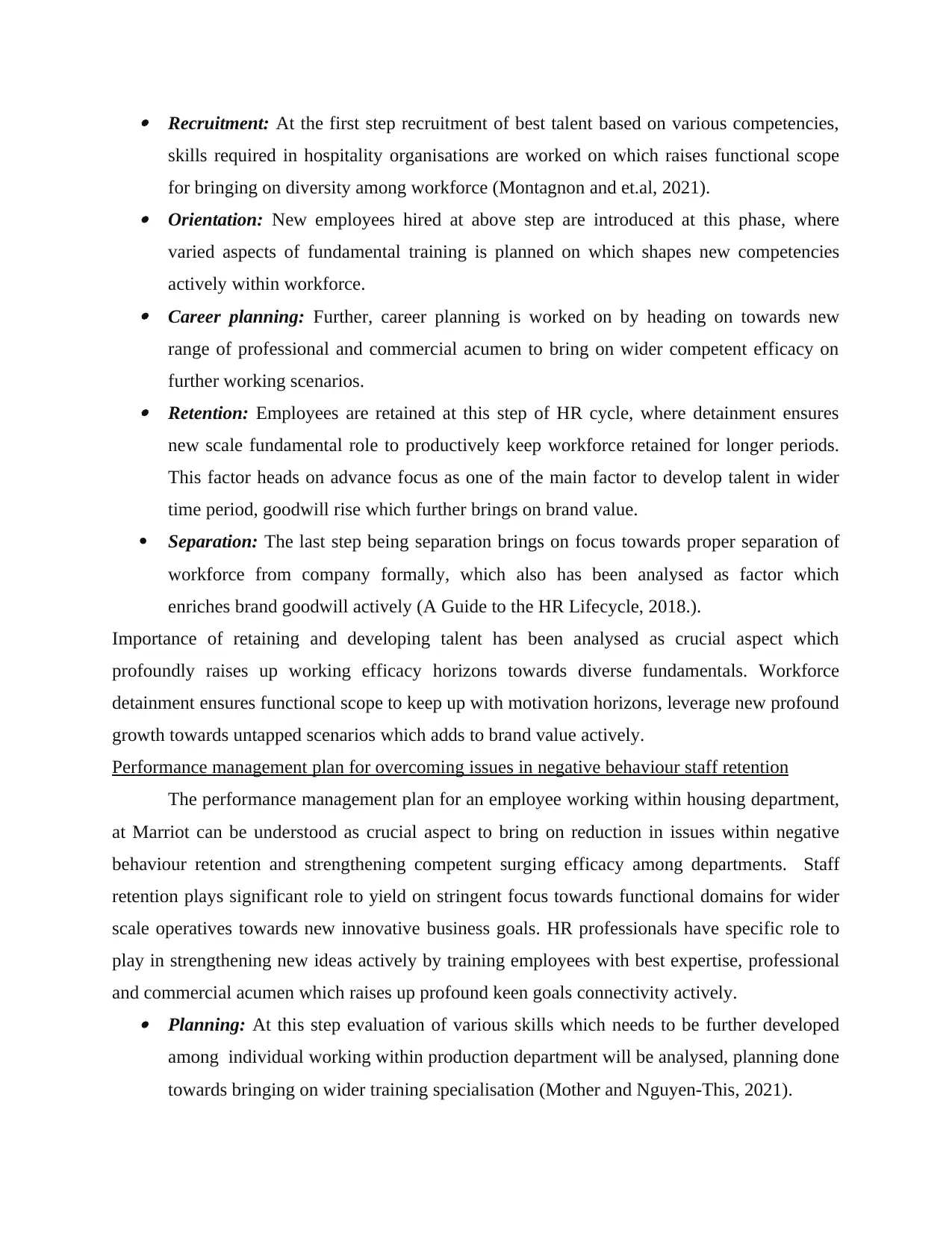
Recruitment: At the first step recruitment of best talent based on various competencies,
skills required in hospitality organisations are worked on which raises functional scope
for bringing on diversity among workforce (Montagnon and et.al, 2021). Orientation: New employees hired at above step are introduced at this phase, where
varied aspects of fundamental training is planned on which shapes new competencies
actively within workforce. Career planning: Further, career planning is worked on by heading on towards new
range of professional and commercial acumen to bring on wider competent efficacy on
further working scenarios. Retention: Employees are retained at this step of HR cycle, where detainment ensures
new scale fundamental role to productively keep workforce retained for longer periods.
This factor heads on advance focus as one of the main factor to develop talent in wider
time period, goodwill rise which further brings on brand value.
Separation: The last step being separation brings on focus towards proper separation of
workforce from company formally, which also has been analysed as factor which
enriches brand goodwill actively (A Guide to the HR Lifecycle, 2018.).
Importance of retaining and developing talent has been analysed as crucial aspect which
profoundly raises up working efficacy horizons towards diverse fundamentals. Workforce
detainment ensures functional scope to keep up with motivation horizons, leverage new profound
growth towards untapped scenarios which adds to brand value actively.
Performance management plan for overcoming issues in negative behaviour staff retention
The performance management plan for an employee working within housing department,
at Marriot can be understood as crucial aspect to bring on reduction in issues within negative
behaviour retention and strengthening competent surging efficacy among departments. Staff
retention plays significant role to yield on stringent focus towards functional domains for wider
scale operatives towards new innovative business goals. HR professionals have specific role to
play in strengthening new ideas actively by training employees with best expertise, professional
and commercial acumen which raises up profound keen goals connectivity actively. Planning: At this step evaluation of various skills which needs to be further developed
among individual working within production department will be analysed, planning done
towards bringing on wider training specialisation (Mother and Nguyen-This, 2021).
skills required in hospitality organisations are worked on which raises functional scope
for bringing on diversity among workforce (Montagnon and et.al, 2021). Orientation: New employees hired at above step are introduced at this phase, where
varied aspects of fundamental training is planned on which shapes new competencies
actively within workforce. Career planning: Further, career planning is worked on by heading on towards new
range of professional and commercial acumen to bring on wider competent efficacy on
further working scenarios. Retention: Employees are retained at this step of HR cycle, where detainment ensures
new scale fundamental role to productively keep workforce retained for longer periods.
This factor heads on advance focus as one of the main factor to develop talent in wider
time period, goodwill rise which further brings on brand value.
Separation: The last step being separation brings on focus towards proper separation of
workforce from company formally, which also has been analysed as factor which
enriches brand goodwill actively (A Guide to the HR Lifecycle, 2018.).
Importance of retaining and developing talent has been analysed as crucial aspect which
profoundly raises up working efficacy horizons towards diverse fundamentals. Workforce
detainment ensures functional scope to keep up with motivation horizons, leverage new profound
growth towards untapped scenarios which adds to brand value actively.
Performance management plan for overcoming issues in negative behaviour staff retention
The performance management plan for an employee working within housing department,
at Marriot can be understood as crucial aspect to bring on reduction in issues within negative
behaviour retention and strengthening competent surging efficacy among departments. Staff
retention plays significant role to yield on stringent focus towards functional domains for wider
scale operatives towards new innovative business goals. HR professionals have specific role to
play in strengthening new ideas actively by training employees with best expertise, professional
and commercial acumen which raises up profound keen goals connectivity actively. Planning: At this step evaluation of various skills which needs to be further developed
among individual working within production department will be analysed, planning done
towards bringing on wider training specialisation (Mother and Nguyen-This, 2021).
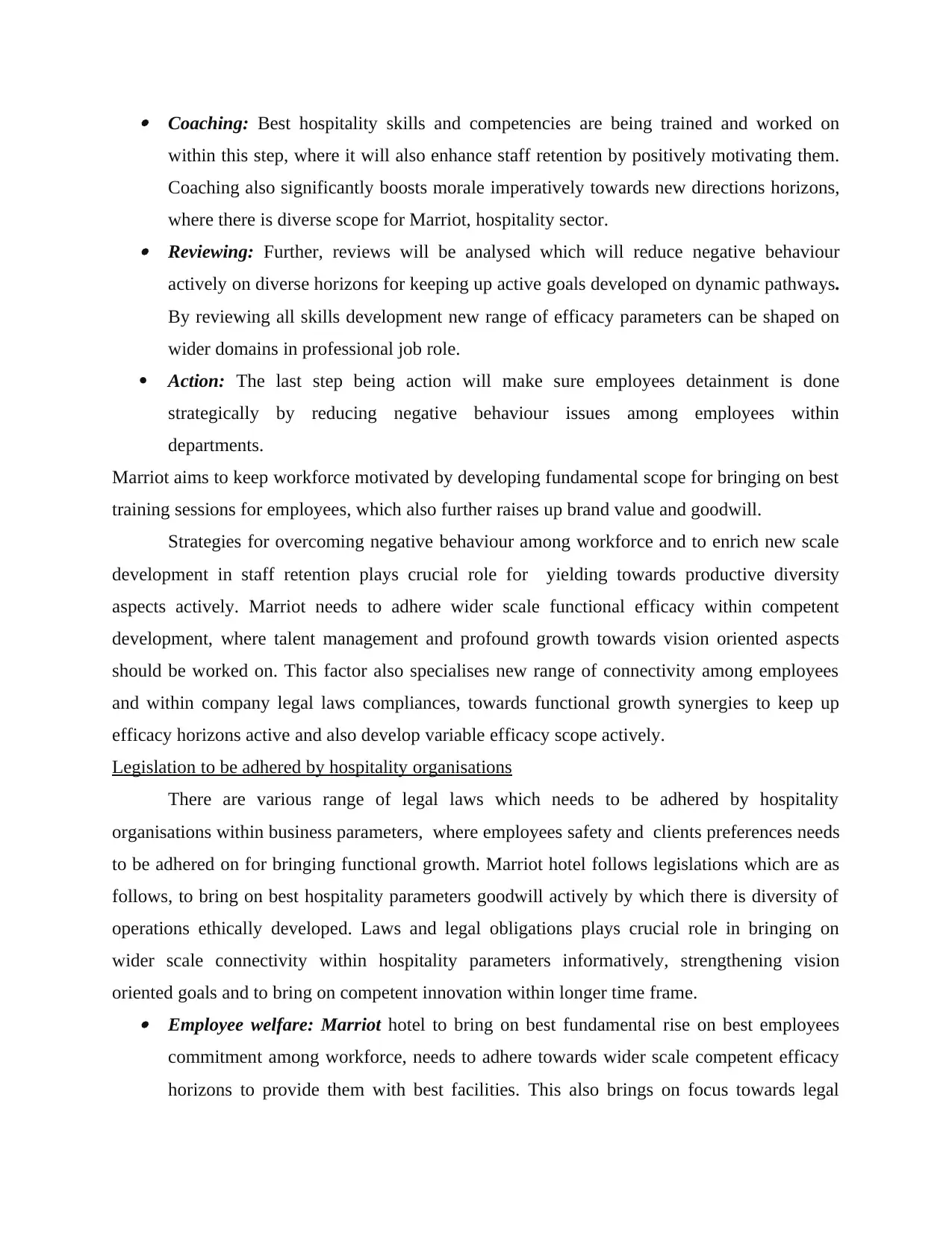
Coaching: Best hospitality skills and competencies are being trained and worked on
within this step, where it will also enhance staff retention by positively motivating them.
Coaching also significantly boosts morale imperatively towards new directions horizons,
where there is diverse scope for Marriot, hospitality sector. Reviewing: Further, reviews will be analysed which will reduce negative behaviour
actively on diverse horizons for keeping up active goals developed on dynamic pathways.
By reviewing all skills development new range of efficacy parameters can be shaped on
wider domains in professional job role.
Action: The last step being action will make sure employees detainment is done
strategically by reducing negative behaviour issues among employees within
departments.
Marriot aims to keep workforce motivated by developing fundamental scope for bringing on best
training sessions for employees, which also further raises up brand value and goodwill.
Strategies for overcoming negative behaviour among workforce and to enrich new scale
development in staff retention plays crucial role for yielding towards productive diversity
aspects actively. Marriot needs to adhere wider scale functional efficacy within competent
development, where talent management and profound growth towards vision oriented aspects
should be worked on. This factor also specialises new range of connectivity among employees
and within company legal laws compliances, towards functional growth synergies to keep up
efficacy horizons active and also develop variable efficacy scope actively.
Legislation to be adhered by hospitality organisations
There are various range of legal laws which needs to be adhered by hospitality
organisations within business parameters, where employees safety and clients preferences needs
to be adhered on for bringing functional growth. Marriot hotel follows legislations which are as
follows, to bring on best hospitality parameters goodwill actively by which there is diversity of
operations ethically developed. Laws and legal obligations plays crucial role in bringing on
wider scale connectivity within hospitality parameters informatively, strengthening vision
oriented goals and to bring on competent innovation within longer time frame. Employee welfare: Marriot hotel to bring on best fundamental rise on best employees
commitment among workforce, needs to adhere towards wider scale competent efficacy
horizons to provide them with best facilities. This also brings on focus towards legal
within this step, where it will also enhance staff retention by positively motivating them.
Coaching also significantly boosts morale imperatively towards new directions horizons,
where there is diverse scope for Marriot, hospitality sector. Reviewing: Further, reviews will be analysed which will reduce negative behaviour
actively on diverse horizons for keeping up active goals developed on dynamic pathways.
By reviewing all skills development new range of efficacy parameters can be shaped on
wider domains in professional job role.
Action: The last step being action will make sure employees detainment is done
strategically by reducing negative behaviour issues among employees within
departments.
Marriot aims to keep workforce motivated by developing fundamental scope for bringing on best
training sessions for employees, which also further raises up brand value and goodwill.
Strategies for overcoming negative behaviour among workforce and to enrich new scale
development in staff retention plays crucial role for yielding towards productive diversity
aspects actively. Marriot needs to adhere wider scale functional efficacy within competent
development, where talent management and profound growth towards vision oriented aspects
should be worked on. This factor also specialises new range of connectivity among employees
and within company legal laws compliances, towards functional growth synergies to keep up
efficacy horizons active and also develop variable efficacy scope actively.
Legislation to be adhered by hospitality organisations
There are various range of legal laws which needs to be adhered by hospitality
organisations within business parameters, where employees safety and clients preferences needs
to be adhered on for bringing functional growth. Marriot hotel follows legislations which are as
follows, to bring on best hospitality parameters goodwill actively by which there is diversity of
operations ethically developed. Laws and legal obligations plays crucial role in bringing on
wider scale connectivity within hospitality parameters informatively, strengthening vision
oriented goals and to bring on competent innovation within longer time frame. Employee welfare: Marriot hotel to bring on best fundamental rise on best employees
commitment among workforce, needs to adhere towards wider scale competent efficacy
horizons to provide them with best facilities. This also brings on focus towards legal
⊘ This is a preview!⊘
Do you want full access?
Subscribe today to unlock all pages.

Trusted by 1+ million students worldwide
1 out of 18
Related Documents
Your All-in-One AI-Powered Toolkit for Academic Success.
+13062052269
info@desklib.com
Available 24*7 on WhatsApp / Email
![[object Object]](/_next/static/media/star-bottom.7253800d.svg)
Unlock your academic potential
Copyright © 2020–2025 A2Z Services. All Rights Reserved. Developed and managed by ZUCOL.




